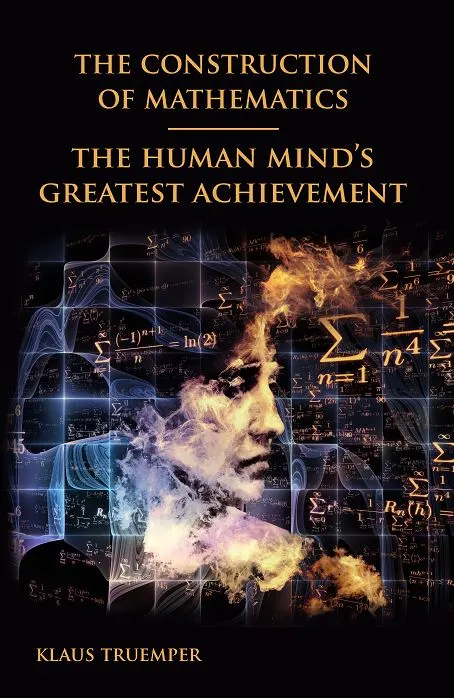Dr. K. Truemper Publishes His Latest Book, The Construction Of Mathematics: The Human Mind’s Greatest Achievement — Is Mathematics “Created” Or “Discovered”?

For 40 years Dr. Klaus Truemper, a distinguished Professor Emeritus of Computer Science at the UT Dallas, has been conducting research on the foundation of mathematics. He recently published his insights and findings in his new book titled The Construction of Mathematics: The Human Mind’s Greatest Achievement. He is the author of additional books on mathematics and computer science and related software.
We spoke to Dr. Truemper about his newest publication and his upcoming lecture tour where he will be visiting several universities and research institutes in Germany and Italy to deliver the lecture “Wittgenstein’s Philosophy and the Creation vs. Discovery Question of Mathematics.”
What kind of research did you do for this book?
The research went on for about 40 years. During that time, I studied the works of the philosopher Ludwig Wittgenstein as well as a large number of books on the history of mathematics. Good examples are the four-volume treatise by James Newman on the history of mathematics (more than 2,500 pages!) and the extensive work of Florian Cajori. Also of importance were the Stanford Encyclopedia of Philosophy and Wikipedia. To verify claims and get insight into various areas, I contacted a number of specialists, including researchers in brain science.
In fact, for every aspect of the book outside the discussion of Wittgenstein, I contacted a specialist and asked for, and almost always obtained, a review of the relevant portion of the book. In a nutshell, it takes a global community to create a book such as this.
Of crucial importance was the study of the methodology of Wittgenstein, who proposed a powerful tool for the investigation of philosophical questions, such as the one treated in the book: Is mathematics created or discovered? For the Wittgenstein material in the book, I did not need confirmation since I had studied it starting in 1969.
What inspired you to write this book?
Around 1979/80, I had a talk with one of my PhD students. I asked him whether mathematics was created or discovered. Without showing any uncertainty, he said that mathematics was discovered and not created. I was stunned that he was so sure about his answer. As for me, I had doubts. So right then I decided it was worthwhile to pursue an answer for this question in earnest.
About six years ago, I was asked to give a talk at a workshop in Aussois, France, about the material I had amassed. It took a full year to prepare the one-hour talk. Afterward, one person urged me to write an extended paper for publication by the German Mathematical Society. I couldn’t see how the arguments could be squeezed into a paper even if 30-40 pages were used. So instead, I embarked on writing a book. The writing itself took two years.

Dr. Truemper, would you mind giving a brief description / synopsis of your book?
If you Google “invention or discovery of mathematics,” you get more than half a million websites. When you start to scan them, you realize that the question about creation or discovery of mathematics is of enormous interest. In fact, there have been debates about this question from the time of Plato, 2400 years ago. And the debate is still going on today. The book tackles this question using the methodology of Wittgenstein. In essence, he says that one first must look at many examples and facts of a given philosophical questions. He then proposes a technique called language games to investigate those facets.
I understand you are going to go on a lecture tour through Germany and Italy during May and June where you will be discussing key points in your book. What are some of the topics from your book you plan on discussing?
It is impossible to give just an overview over the book in a one-hour presentation. The book has around 200 pages of text and then another 80 pages of technical notes. However, even that material summarizes many notions and ideas. If I were to give an in-depth presentation of the book, it would take a number of one-hour lectures. Therefore, the single lecture I will give in Germany and Italy during the upcoming visit of universities and institutes will just be providing some ideas about the content of the book. We will go over two or three key facts of the history of mathematics, then summarize Wittgenstein’s philosophy and methodology, and apply these thoughts to the creation versus discovery question. We also look at the effectiveness with which mathematics has been used understand nature, and the question whether humans must use mathematics in order to survive. Finally, we use results of modern brain science to investigate the following question: How is it possible that very intelligent people, arguing over centuries, come up with diametrically opposed answers? This doesn’t happen in the sciences.
When you discuss the notion of whether mathematics is a human construct or a naturally occurring phenomenon just waiting to be discovered, what kinds of reactions do you get? Does it vary depending upon the degree to which that person is a practicing scientist vs. a philosopher?
Yes, the professional training matters a great deal! And the chapter on brain science tries to explain why this is so. Generally speaking, mathematicians of the 19th and early 20th century had a mix of opinions. Today, most mathematicians claim discovery. I don’t have much insight into the opinions of engineers and scientists, but from the limited information I have, they give both answers.
If you could interview yourself from 40 years ago, how would you have come down on this question? How have your ideas evolved through time?
Forty years ago I was convinced that the advanced material in mathematics was created. However, I wasn’t sure whether this could be claimed for the more elementary parts of mathematics, such as the natural numbers. So in a way, as time went on, the part that might have been discovered, kept on shrinking. Today, I am convinced that all of mathematics has been, and continues to be, created.
In layman’s terms, can you describe the position of each camp in this discussion?
Creation argument: Humans have gradually developed mathematics, starting with pebble piles that came to represent numbers.
Discovery argument: Mathematics exists already, possibly in some metaphysical space, and humans discover these results.
Now justifying either answer is complicated, and I will not attempt this here. The book is demonstration that it takes a lot of arguments and discussion to get insight into the question. Anything I would say here would be a gross simplification.
Is there any overlap between the arguments of those who believe in mathematics being a human construct vs. those who believe it to be a naturally occurring phenomenon?
Yes, indeed. One camp says the following: The axioms and basic concepts of mathematics are created by humans. As soon as that is done, all results that could possibly be proved from these basic definitions come into existence, and are then gradually discovered by humans.
If the answer turns out to be a blend of both positions, can you give examples of each? If the answer is not a blend, but rather the answer lies squarely in one camp, can you give an example where clear analysis leads you to this conclusion.
You are asking me to do the impossible. At least Wittgenstein would have said that the information you are desiring cannot be assembled. This stems from the fundamental insight of Wittgenstein that there are statements that are syntactically correct, that seemingly even make sense when interpreted by the human brain, but that nevertheless are, in Wittgenstein’s terminology, senseless. One could also say that such statements are impermissible. How he came to make this claim, and what it means for philosophy, I cannot possibly summarize here. The book does this in one of the chapters.
Addendum: Early comments about the book are included on the Amazon website listing the book.
ABOUT THE UT DALLAS COMPUTER SCIENCE DEPARTMENT
The UT Dallas Computer Science program is one of the largest Computer Science departments in the United States with over 2,100 bachelor’s-degree students, more than 1,000 MS master’s students, 150 PhD students, and 86 faculty members, as of Fall 2016. With The University of Texas at Dallas’ unique history of starting as a graduate institution first, the CS Department is built on a legacy of valuing innovative research and providing advanced training for software engineers and computer scientists.




